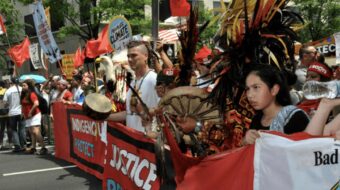
On July 30, voters in Venezuela braved street violence by the right wing opposition and turned out en masse to elect a new National Constituent Assembly, an action allowed by the current constitution. Electoral authorities said that a total of 8,089,320 votes were cast, totaling 41 percent of eligible voters in this South American country of 30 million. This is an impressive total, considering that the right wing opposition, which has been agitating to oust President Nicolas Maduro, boycotted the vote.
Because of that boycott, the 545 delegates elected to the Constituent Assembly are overwhelmingly supporters of the left wing Bolivarian movement, and opponents of the right.
However, this does not mean, as is falsely claimed by the right wing nationally and internationally, including President Trump, that the Constituent Assembly will be a passive rubber stamp for Maduro’s government, and that Venezuela is now a dictatorship. Discussion going into the election and subsequently, as the Constituent Assembly has quickly begun its work, is not merely about supporting the government against the right, but also about pressuring for changes in the functioning of Maduro’s government. This is why grassroots organizations of every kind strongly supported the Constituent Assembly.
Among the organizations which pushed hard for the National Constituent Assembly are the Communist Party of Venezuela (PCV), the National Front of Working Class Struggle (FNLCT) and other Marxist groups which work closely together.
The organizational secretary of the PCV, Perfecto Abreu Nieves, wrote in the PCV’s newspaper “Tribuna Popular” (“People’s Tribune”) the direction in which his party wants to see the Constituent Assembly move: “The Constituent Assembly and its members should develop mechanisms of true and direct linkage with the masses, to be in line with the real needs of the people, and should be receptive to the proposals of the people’s movement”.
This, says the PCV, will entail a big shakeup in the way the Bolivarian government has been functioning, and a move in the direction of greater grassroots democracy, and a departure from the current unviable economic model in which Venezuela generates money by selling its main natural resource – oil—on the international markets, and then ends up importing a large number of things that it could really produce for itself.
The sudden drop in oil prices has created an immediate crisis in Venezuela, which involves inflation, scarcities, the growth of the black market and smuggling, and a drain on Venezuela’s sovereign funds. The government has been trying to solve the last named problem by selling state assets so as to be able to borrow more from international finance capital, an approach which the communists and others sharply criticize. Another person writing in Tribuna Popular, Andrés Villadiego, calls this “the strategy of paying so as to be able to get into debt again.”.
Instead of this vicious cycle, the PCV ran its candidates for the Constituent Assembly on a platform of radical change, including the following things, to name just a few:
*Tax reform, i.e. to make Venezuela’s freewheeling rich strata carry their fair share of the burden of solving the nation’s economic crisis.
*Nationalization of banks and foreign trade.
*Reduce the power of the presidency and greatly increase the power of the grassroots in the making and running of policy, moving toward a “people’s parliamentary regime with genuine leadership by the people in decision making.
*Deep labor law reform to greatly increase the rights of workers and their unions, eliminating obstacles to unionization, collective bargaining and the right to strike.
*Improvements in the access of the whole Venezuelan people to essential services including health, education, food and other things, which will require eliminating mechanisms of speculation which currently disrupt access, and the establishment of a “comprehensive system of social security.”
*Militant defense of Venezuela’s independence and national sovereignty, in coordination with the peoples of other nations threatened by imperialism.
Furthermore, the PCV promises to advocate for changes in agricultural policy which would “adopt a strategy for the development of productive forces [in agriculture] which is in harmony with the environment” and guarantees the rights of agricultural workers. This would involve elimination of the use of transgenics, and the excessive use of pesticides and artificial fertilizers.
Though the revolutionary left did not win a majority of the seats in the National Constituent Assembly, it is very likely that this program put forward by the PCV and its close allies will garner widespread support both in the Constituent Assembly and in the country. How could anybody oppose such things without blushing? Yet the PCV warns that all this will not be achieved unless the work in the Constituent Assembly is accompanied by continued mass mobilization of the grassroots.
This program can hardly be seen as “anti-democratic,” or as a “rubber stamp” mechanism for Nicolas Maduro to turn himself into a dictator. It is a profoundly democratic program and is very likely to be supported by the Constituent Assembly.
Regional elections, in which both Bolivarians and the opposition will take part, are now scheduled for December 10. If the left runs on this program, it will be extremely difficult for the right to come up with something equally attractive to the voters.
Yet the U.S. government tried to forbid Venezuela from going ahead with the Constituent Assembly elections, and now is making threats of armed intervention.












Comments